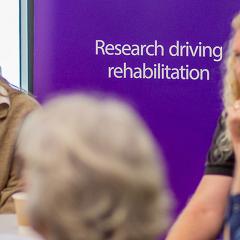Dr Jane Nikles, Dr Carrie Ritchie and Professor Michele Sterling, researchers from the Designing Better Therapies program at RECOVER and with funding from the NHMRC CRE in Recovery following Road Traffic Injuries, have been investigating the way whiplash associated disorders are managed in Australia. The research has turned up some unexpected findings, including that doctors prescribe opioids more frequently to patients than recommended by current whiplash management guidelines.
The whiplash guidelines - developed by SIRA - recommend that simple analgesics (e.g. paracetamol and nonsteroidal anti-inflammatory medicines) are to be used in the first instance, with opioids to be prescribed only if the injured person has severe pain.
What is a whiplash associated disorder?
Whiplash associated disorders, or 'WAD' for short, is the term used to describe a variety of symptoms that typically result from an acceleration/deceleration injury to the neck, usually after a motor vehicle crash. Although symptoms of WAD may be varied, neck pain is the main symptom.
Little has been known about medicine use for people with WAD, until now.
Dr Nikles describes some research findings, “Our work has shown that both GPs and Emergency Departments frequently prescribe opioids for people with a whiplash injury, even to those with lower more manageable levels of pain where other safer treatments such as physiotherapy would likely suffice.”
 Dr Ritchie continues, “Evaluation of medicine use in people with WAD showed a range of medicines used over both early, acute (up to 12 weeks) and later, chronic (12 weeks to 2 years) post-injury periods. While over half of people with WAD were prescribed non-steroidal anti-inflammatory medicines, over one half were prescribed weak opioids, and over one quarter were prescribed benzodiazepines both acutely and chronically. In addition, strong opioid use increased during the chronic post-injury period. Strong opioids are not recommended for chronic pain, and benzodiazepines are ineffective for acute and chronic musculoskeletal pain.”
Dr Ritchie continues, “Evaluation of medicine use in people with WAD showed a range of medicines used over both early, acute (up to 12 weeks) and later, chronic (12 weeks to 2 years) post-injury periods. While over half of people with WAD were prescribed non-steroidal anti-inflammatory medicines, over one half were prescribed weak opioids, and over one quarter were prescribed benzodiazepines both acutely and chronically. In addition, strong opioid use increased during the chronic post-injury period. Strong opioids are not recommended for chronic pain, and benzodiazepines are ineffective for acute and chronic musculoskeletal pain.”
The frequent prescription of opioids for people with whiplash associated disorders is concerning as the ongoing use of opioids can be associated with negative health outcomes, such as increased pain, misuse, addiction and overdose.
Dr Nikles again “To address this important issue more research is needed. We need to work closely with GPs, Emergency Departments and injured people to find ways to improve the use of opioids for this population, and explore alternatives to opioids while providing effective pain relief.”
Resources
- adf.org.au/drug-facts/opioids
- adf.org.au/drug-facts/benzodiazepines
- www.sira.nsw.gov.au/for-service-providers/treatment-advice-centre/acute-whiplash/resources-for-recovery/whiplash-guidelines
- www.sira.nsw.gov.au
References1-4
- Nikles J, Yelland M, Bayram C, Miller G, Sterling M. Management of whiplash associated disorders in Australian general practice. BMC musculoskeletal disorders 2017;18(1):551.
- Nikles J, Keijzers G, De Silva MID, Khan S, Sterling M. Use of and attitudes to the role of medication for acute whiplash injury: A preliminary survey of emergency department doctors. Emergency Medicine Australasia 2018;doi.org/10.1111/1742-6723.13190.
- Nikles J, Khan S, Leou J, Keijzers G, Ng J, Bond C, et al. Retrospective descriptive observational study of patients who presented to an Australian hospital Emergency Department with neck soft tissue injury. Emergency Medicine Australiasia 2019.
- Ritchie C, Hollingworth SA, Warren J, Sterling M. Medicine use during acute and chronic post-injury periods in whiplash injured individuals. Pain 2018;160(4):844-51.



